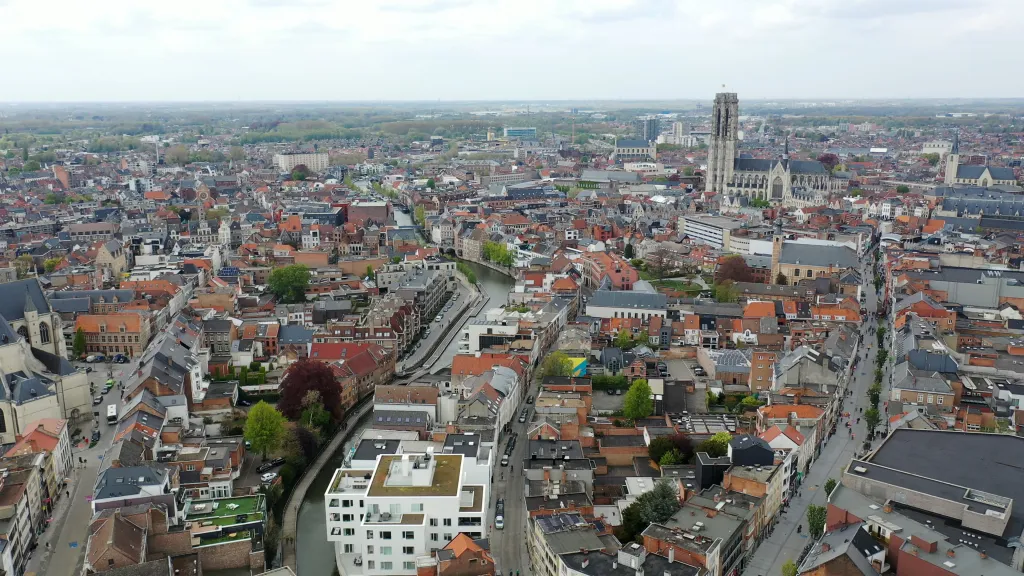Mechelen
Challenge
How to measure the CO2 emissions and its possible reduction for freight transport?
CURRENT SITUATION
The city of Mechelen has signed a covenant with 33 logistics service providers and interest organisations to realise zero emission city logistics by 2030. In doing so, we have aligned ourselves with the European guidelines as defined in the 2011 white paper ‘Roadmap to a single European Transport Area’. This document urges us to: ‘……set the goal of achieving essentially CO2-free city logistics in major urban centres by 2030.’
Mechelen is pursuing the following transition, taking into account the technical evolutions and availability in relation to zero-emission vehicles:
- 2023: 20% of deliveries to be made with 0-emission vehicles
- 2027: 50% of deliveries to be made with 0-emission vehicles
- 2030: 100% of deliveries to be made with 0-emission vehicles
The covenant was signed in September 2020. In the meantime, a lot of negotiating has took place between the city and logistics companies concerning the switch of fleet to 0-emission vehicles. Bpost, the largest courier company in Belgium, is already delivering the whole of Mechelen with electric vans or electric cargobikes and -trailers. DPD is experimenting with an electric van. Efforts are taking place, but for the moment there is no monitoring or analysis of the actual impact on CO2 emissions. A baseline also hasn’t been set.
In the current situation there is no collection, follow-up nor analysis on data level of the goal of zero emission city logistics, so the gradual transition as defined here above isn’t being monitored.
Therefore the city is looking for a ‘simple’ solution to be able to start with this monitoring, define a baseline and follow the evolution in CO2 emissions.
NB: zero emission is defined as follows in the covenant:
Zero-emission vehicles are emission-free at the exhaust (tank-to-wheel) when operating in a zero-emission zone. This means vehicles that do not emit any CO2 or air pollutants within a zero-emission zone. Practically translated, the following vehicles meet the definition:
- Electric cars (BEV – Battery Electric Vehicles);
- Plug-in hybrids (PHEV – Plug-in Hybrid Electric Vehicles)
- Vehicles powered by fuel cells (FCEVs – Fuell Cell Electric Vehicles);
By preference, they are also powered by green energy.
Expected to-be situation
Expected outputs
- Development of a ‘device’ to measure CO2 emissions of logistics traffic
- Making a baseline measurement as a starting point that can be used for comparison.
- Measurement and analysis of the envisaged transition
- A software tool, for example a dashboard, that shows the CO2 and its evolution
Expected impacts
- Depending on the developed device: installation of a minimum of 4 measurement points or installation of a device on a representative number of logistics vehicles.
- Engagement of logistics service providers.
- Engagement of shop owners.
- Making the promise of our covenant concrete, ‘alive’ and tangible.
- Creation of sense of urgency with the logistics sector
- Creation of more involvement of the logistics sector
- Actually lowering the zero-emissions following the procentual transition as defined in the covenant

Solution
- Everimpact’s data-driven solution allows cities to monitor logistics traffic and emissions in real-time via satellite data, sensors and AI. The solution’s dashboard allows for tracking of decarbonisation plans including synergies of different measures. The platform can provide certified emissions and sequestration data to unlock access to green finance.
- Everimpact sensor networks can monitor CO2 as well as vehicles. Through AI algorithms running on the cameras, sources of the emissions are able to be categorised into various groups such as transportation, residential and more as well as distinct vehicle types.


